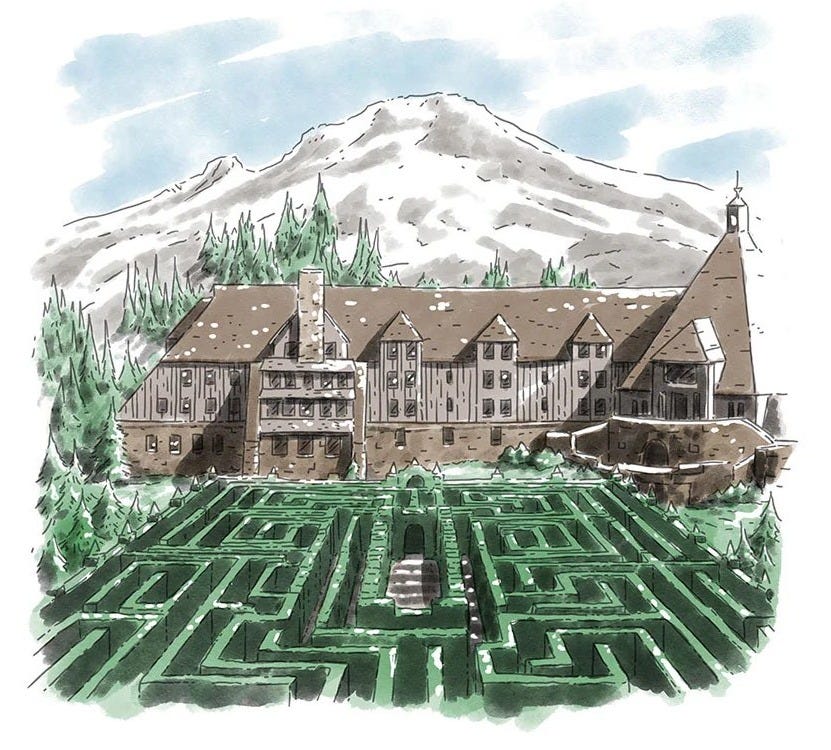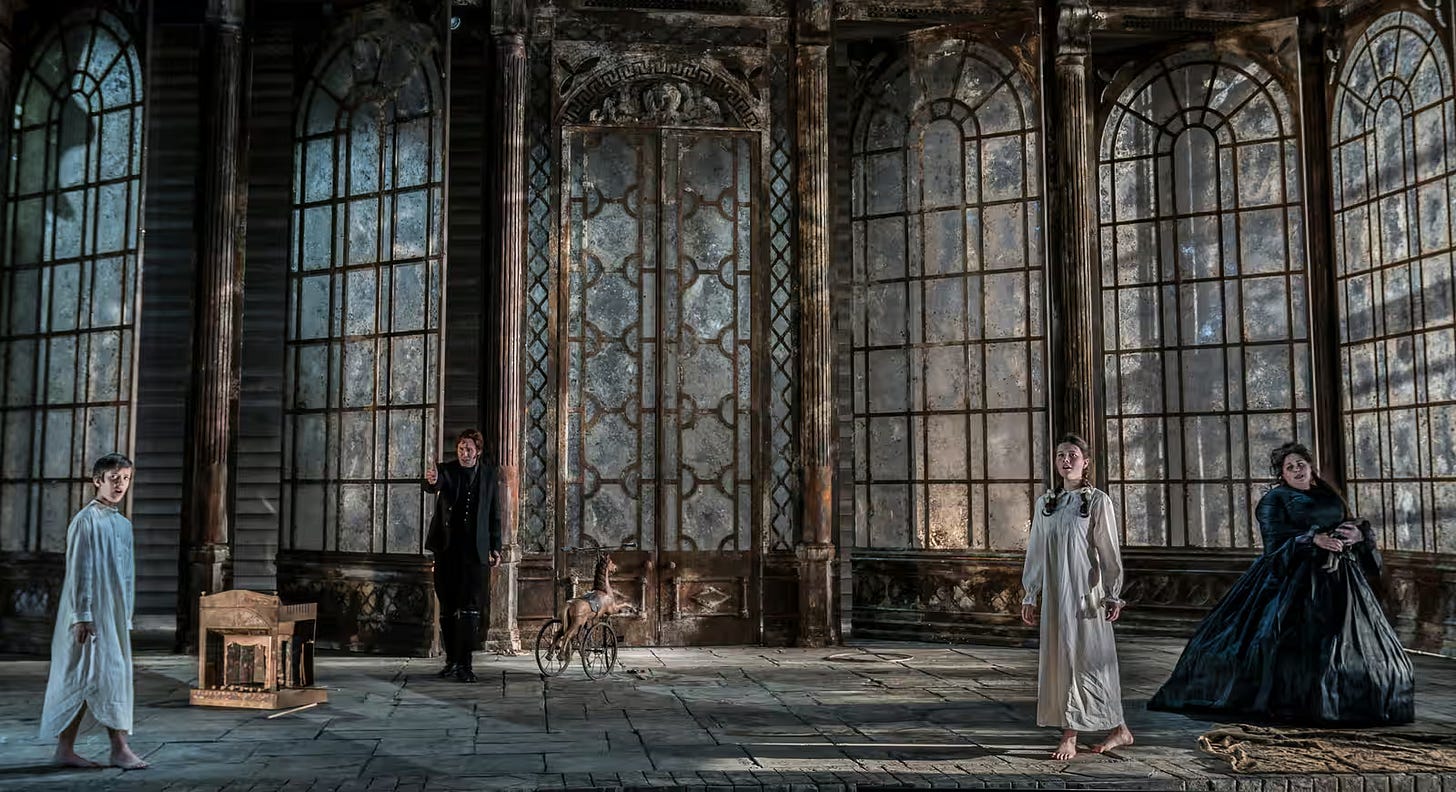‘Horror Moments’ is a weekly series examining horror-inflected scenes and themes in unexpected places. The ‘moments’ are published weekly on Thursdays, and I share articles on the history of magic, theatre, storytelling, and more on Mondays. Catch up with the recent Kate Bush series here and the full back catalogue of horror moments (from Wallace & Gromit to Shakespeare) here. Don’t forget to subscribe!
Paul Moravec’s 2016 opera The Shining is an adaptation of Stephen King’s 1977 novel, which is itself a very different beast from the most famous version of the story: the 1980 Stanley Kubrick film. King famously had a lot of misgivings about Kubrick’s vision, despite the general consensus being that it is one of the greatest horror films of all time.
Moravec, and his librettist Mark Campbell, deliberately returned to the original text to adapt the story from scratch. Opera has a completely different language than film, so it seemed plausible that the new version might find its own voice, so to speak.
Could it be done?
An Evil Hotel
The plot of the opera, following the novel, is as follows:
Jack Torrance, his wife Wendy, and their son Danny, arrive at the remote Overlook Hotel where Jack will serve as a caretaker during the winter off-season. Alone in the hotel, it soon becomes apparent that the family is under siege from two sources of dread. Source 1 is the hotel itself which has hosted (perhaps provoked) a sequence of bloody events including a massacre committed by a former caretaker who killed his wife and daughters.
Source 2 is from within the family itself as Jack begins to menace his wife and child. He increasingly resembles both the murderous former caretaker and his own abusive father.
But there is hope. Before they were locked in, hotel cook Dick Hallorann had detected in little Danny a clairvoyant power called the ‘shining.’ Danny is therefore able to telepathically call for his help once it has become clear that Jack is trying to kill them. In a moment of lucidity, Jack allows the boy to run away from him, just in time for Hallorann to step in and rescue Danny and Wendy before the boiler explodes. Jack stays behind to die as the hotel is destroyed, breaking the cycles of abuse.
The Shining as an Opera
In the production notes, Mark Campbell describes how he went about turning this plot into a piece of sung storytelling:
“My process began by identifying what events in the story were crucial, what were stage-worthy and what would keep the story’s propulsion going. I condensed the novel’s time period of many months into several weeks in the libretto, with Act II occurring in a 24-hour period. I placed the bulk of the story in one setting: the Overlook Hotel. I forced all of the story’s events into a collision in the Act I finale—including the physical entrance of the hotel’s ghosts. I also introduced staged orchestral interludes into Act I to show time passing. It all somehow just came together,,,.”
He’s doing himself a disservice here in that final line, this was an incredible feat and required a skilful hand. Adaptation always feels a bit like unmaking an outfit that has been perfectly tailored for particular proportions and remaking it for a new body without disrupting the original design. It sometimes simply doesn’t work — but the consensus from reviewers was that The Shining (2016) did in fact hit the ball out of the park.
(Incidentally, if you’re wondering why someone is dressed as a dog, check out my recent horror moment on dog/men in opera and horror films which mentions *that scene* in Kubrick’s The Shining.)
The composer, Paul Moravec, explained why the novel was more operatic than it first appeared:
‘One of the operatic aspects of King’s novel is the presence of resonant archetypes. Whether consciously or not, one of those archetypes is the Dr-Jekyll-and-Mr-Hyde story: Jack Torrance is genuinely conflicted. Jack’s relationship to his son Danny also reminded me of the Abraham-and-Isaac story…’
He mentions the big themes of power, death and love which are naturally suited to being painted with broad brushstrokes in the operatic form. Surely there are many horror novels that share precisely these thematic fixations and would, therefore, make excellent operas?
Gothic Novels and Opera
By some accounts, The Shining is effectively a gothic novel, which might explain why it translates so well to opera. Many gothic tales come in novellas or short stories which makes them easier for a librettist to pare down. There are opportunities for a range of singing styles: intimate arias, psychosexual duets, jealous trios, ghostly choruses and so on. They have that same operatic fixation with big themes — death, desire, innocence, obsession — and are often set in a big posh house which, like the Overlook Hotel, can become a character in its own right and give the set department an interesting challenge.
A gothic novella that fits this template perfectly is Henry James’ The Turn of the Screw (1898), the story of an isolated governess becoming fixated with the threat of supernatural interference with her young wards.
Cue Benjamin Britten:
Anyone who followed my last series of horror moments in the work of Kate Bush will have read about how the film adaptation, which was called The Innocents (1961), inspired Bush’s brilliant but uncomfortable song ‘The infant Kiss.’ It was Britten who got there first before either of these versions in 1954.
I won’t say too much about the plot because I’ve covered the story before, but suffice it to say that The Turn of the Screw, like The Shining, works brilliantly as an opera. What’s more, both adaptations seem to manage that near-impossible feat of putting something on stage that is genuinely scary. Moravec is able to set Jack’s terrifying mental unravelling to music, you feel genuinely uncomfortable every time he lunges and cries out, his baritone voice as mighty and fatalistic as the axe. Britten’s work lets us feel each quiver of the governess’ complex fears and allows the line between the real and unreal to become blurred. When the ghosts appear they are skin-crawlingly creepy — just look at the way that hand reaches out of a piano in this trailer!
Two very different horror novels; two extraordinary operatic adaptations.
Next week, in my final horror moment in this opera series, I’ll be looking at a horror-opera that draws directly on a film rather than an original prose source, and has music written by the same composer who wrote the soundtrack of that film.
Which horror novels do you think would make great operas? Tell me in the comments below and until next time, happy nightmares everyone!
Horror moments are posted every Thursday and a wide variety of articles exploring the history of magic, theatre, storytelling, and more are published on Mondays.
Remember that you can pay to subscribe for extra benefits or buy me a coffee here to keep me writing. You can also like, share, comment, and recommend to help the substack grow. Thank you!









My first thought (which is always the most off the rails) was it would be fascinating to see Don’t Breathe or Quiet Place, both movies that have a really intentional relationship with sound engineering (both feature characters who are HOH) staged as operas, and the second was anything Guillermo del Toro (but especially Shape of Water—though that doesn’t count bc it’s technically a romance)
I wonder if The Haunting of Hill House would fit the bill. It certainly shares some characteristics with The Shining. It’s a story more of atmosphere than plot which might work in its favour.